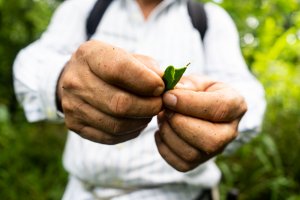Students build teamwork and skills while making multimedia documentary in the Galápagos Islands

By Beth Hatcher
“Living Galápagos,” a multimedia documentary project produced by students in Professor Pat Davison’s and Adjunct Instructor Tamara Rice’s spring 2022 “MEJO 584: International Projects” classes, premiered April 26 in the Nelson Mandela Auditorium of the UNC FedEx Global Education Center.
“MEJO 584” is a global storytelling course that allows students to travel internationally to create a documentary each spring — though travel was halted during the COVID-19 pandemic. Davison and Rice led their students on a trip to the Galápagos Islands in March 2022.
The photo at right is by Caroline Bittenbender '24 and is from the project's "Living on the Land" story. The title image of this article is by Angelina Katsanis '23 and is from the project's "Currents of Change" story. All photos and videos courtesy of the “Living Galápagos" project.
Famous for its wildlife, the Galápagos Islands also support a vibrant human community. “Living Galápagos” explores issues facing the people of San Cristóbal, one of the islands in the Galápagos chain located off the coast of Ecuador, and their relationship with their unique surroundings.
UNC has an existing relationship with Ecuador’s Universidad San Francisco de Quito, and together the organizations run the Galápagos Science Center on San Cristóbal Island. Davison has taken previous classes, but this trip marked his first visit back with a class in almost a decade.
Watch a video from the project's "Currents of Change" story below.
For the project, students were divided into five story teams containing photographers, videographers, designers, developers and reporters. Each team focused on a different topic: marine ecosystems, terrestrial ecosystems, governance, tourism and culture.
During the trip, students learned as much about teamwork as they did about the Galápagos Islands, Davison said.
“Projects like this are immersive, experiential and interdisciplinary, and it’s important that students get a chance to work in teams like this here at the school because that’s what they’ll be doing in the real world,” Davison said.
The students plan the project from its inception, collecting research and contacts throughout the semester long before the trip begins.
“[The instructors] choose the locations, and the students choose the stories,” Rice said. “The students take a lot of pride in their work.”
The trip’s logistics — from story assignments to finding local contacts — provide much of the project’s learning curve, said student Susie Webb ’24. “A lot of work in the field is figuring out how people can best do what they’re good at,” she said.
Work then continues back in Chapel Hill, as students polish up the project’s interactive website. Prior to the trip, Webb was part of a team that designed the project’s logo. After the trip, she helped run an accessibility audit on the website.
Watch a video from the project's "At What Cost" story below.
Master’s student Chris Kammerer worked as a reporter on the culture team, sourcing stories about the island’s inhabitants, many whose ancestors came to the island from mainland Ecuador not that long ago. Kammerer found the assignment interesting. Most people, like him, know more about the Galápagos Islands’ natural environment than its people, an unequal division of attention that affects island locals’ daily lives.
“A lot of the government funding down there goes toward the environment,” Kammerer said. “But people also want money for community infrastructure and projects.”
Teaching Associate Professor Kate Sheppard, one of the project’s coaches, said that learning the intricacies of other cultures, as well as each other, were important lessons for the students in the class.
“This class is a truly immersive experience. They are learning not just how to work abroad … they are also learning how to work collaboratively in multimedia story teams, which includes navigating each other's needs and sometimes competing priorities,” Sheppard said. “It's as close to real newsroom experience as you can get.”
Recent “MEJO 584” trips have explored Venezuelan immigration to Colombia and environmental concerns in the central American country of Belize. “MEJO 584” students have also done work in other countries around the globe, such as Thailand, Argentina, Mexico, Malawi, Panama, Cuba and Puerto Rico.
See some of those past projects here.
Learn more about “Living Galápagos” at the project’s interactive website.